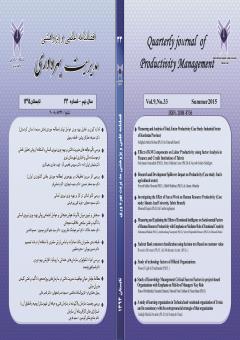Effect of KM Components on Labor Productivity using factor Analysis in Finance and Credit Institution of Tabriz
Subject Areas : Business Management
Soleyman Iranzadeh
1
*
![]() ,
sirus fakhimiazar
2
,
Ayoob Jedare sefedgare
3
,
sirus fakhimiazar
2
,
Ayoob Jedare sefedgare
3
1 - Associate Professor, Department of Management, Tabriz Branch, Islamic Azad University, Tabriz, Iran
2 - Department of Management, Faculty of Management, Economics and Accounting, Islamic Azad University, Tabriz, Iran
3 - باشگاه پژوهشگران جوان و نخبگان،واحدتبریز،دانشگاه آزاد اسلامی، تبریز،ایران
Keywords: Productivity, culture, Technology, Knowledge Management, Policy, Process of practice,
Abstract :
Nowadays competition in the business has made attention to productivity, customer satisfaction and compliance with his requirements more important. In this regard, the effort of organization in order to meet this requirement is based on improving the existing processes in organizations and several improvement philosophies have been introduced. In this paper, mapping knowledge management as a tool to improve the process according to productivity concepts is discussed. It examines the relationship between components (culture, process of practice, policy and technology) and productivity. For data collection, the demographic information, knowledge management and human resources productivity questionnaires were used. To examine the relationship between the variables and their interaction, structural equation modeling was used through Excel and LISREL softwares. The results indicate the relationship between the two structures, or how to change the conceptual model of research. The significant relationship between the dimensions of knowledge of management is confirmed. Based on the results, the component of culture with 0.38 effect rates has the highest effect on human resource productivity, and the other dimensions, i.e. technology, policy, and process of practice are ranked next in priority, respectively.
- Azari, M. (2010), “Knowledge Management, Actions and Challenges”, Tadbir Magazine, N 411.
- Eslami Far, A and moradzehi, M. (2010), “Investigating the Role of Knowledge Management in Human Resource Efficiency of Organizations in Iran”, The First Regional Conference on Research and Development in Accounting and Management.
- Badri Azin, Y; Ameri H, Imanpur, A. (2011), “Sport management”, N 15, 35- 50.
- Changh, M., U. (2009), “The role and influence of organizational leaders in institutionalizing knowledge management”, translation of Laleh Jamshidi, Higher Education, N 81.
- - Donport, M and Prosec, J. (2009), “Knowledge Management”, Translation, Rahman Sarsht, Tehran: Sopko Publishing, V 1.
- Ramezani, E. (2011), “Knowledge Management Process”, Tadbir Magazine, N 761.
- Sarboland, K and azizi, S. (2011), “Investigating the Relationship between Knowledge Management Maturity and Human Capital Productivity of Social Insurance Organization Branches of South Tehran”, First National Conference on Business Management.
- Adli, F. (2009), “Knowledge Management Movement beyond Knowledge”, Tehran: Andosophy Metacognition Publishing.
- Carl, C. (2012), “Knowledge Management from the Perspective of a Business Strategy”, Translation: Sedigheh, Ahmadi, Information Sciences Quarterly, N 8.
- NOruziyan, M. (2007), “Application of knowledge management in the public sector”, Tadbir Magazine, N 651.
- Blom,J. (2009), “A Theory of personalized Recommendations: Proceedings:CHI 02 conference on Human factors in computing systems, 540-541 Minneapolis, Minnesota, USA, Acm press New York,NY, OSA.
- carneiro,Alberto. (2010), “The Role of Intelligent Resources in Knowledge Management”, Journal of Knowledge Management, Volume 5.Numbers 4,pp.358-367
- Davenport,T.H(2011),some principles of knowledge Management, www.Bus. Utexas.Edu/Kman/Kmprin.Htm.
- Dore,L(2010),Winning Though knowlege:How to succeed in the Knowlege Economy,Special Report by the financial world.The chartered Institue of Bankers in Association with Xerox. Nardi,B,Whittaker,s,Schwarz,H. (2012), “lts Not what you know,lts not what You know:work in the Information Age”, First Monday, May.http://www.firstMonday.org
- Timothy, S Kiessling.(2010), “Expploring knowledge management to organizational performance outcomes in a transitional economy”. Journal of World Business, Vol.44, Iss.4, p: 421.
- Thibaut, J.w. Kelley, H.H (2007), “The social psychology Groups”. New York:wley
_||_
- Azari, M. (2010), “Knowledge Management, Actions and Challenges”, Tadbir Magazine, N 411.
- Eslami Far, A and moradzehi, M. (2010), “Investigating the Role of Knowledge Management in Human Resource Efficiency of Organizations in Iran”, The First Regional Conference on Research and Development in Accounting and Management.
- Badri Azin, Y; Ameri H, Imanpur, A. (2011), “Sport management”, N 15, 35- 50.
- Changh, M., U. (2009), “The role and influence of organizational leaders in institutionalizing knowledge management”, translation of Laleh Jamshidi, Higher Education, N 81.
- - Donport, M and Prosec, J. (2009), “Knowledge Management”, Translation, Rahman Sarsht, Tehran: Sopko Publishing, V 1.
- Ramezani, E. (2011), “Knowledge Management Process”, Tadbir Magazine, N 761.
- Sarboland, K and azizi, S. (2011), “Investigating the Relationship between Knowledge Management Maturity and Human Capital Productivity of Social Insurance Organization Branches of South Tehran”, First National Conference on Business Management.
- Adli, F. (2009), “Knowledge Management Movement beyond Knowledge”, Tehran: Andosophy Metacognition Publishing.
- Carl, C. (2012), “Knowledge Management from the Perspective of a Business Strategy”, Translation: Sedigheh, Ahmadi, Information Sciences Quarterly, N 8.
- NOruziyan, M. (2007), “Application of knowledge management in the public sector”, Tadbir Magazine, N 651.
- Blom,J. (2009), “A Theory of personalized Recommendations: Proceedings:CHI 02 conference on Human factors in computing systems, 540-541 Minneapolis, Minnesota, USA, Acm press New York,NY, OSA.
- carneiro,Alberto. (2010), “The Role of Intelligent Resources in Knowledge Management”, Journal of Knowledge Management, Volume 5.Numbers 4,pp.358-367
- Davenport,T.H(2011),some principles of knowledge Management, www.Bus. Utexas.Edu/Kman/Kmprin.Htm.
- Dore,L(2010),Winning Though knowlege:How to succeed in the Knowlege Economy,Special Report by the financial world.The chartered Institue of Bankers in Association with Xerox. Nardi,B,Whittaker,s,Schwarz,H. (2012), “lts Not what you know,lts not what You know:work in the Information Age”, First Monday, May.http://www.firstMonday.org
- Timothy, S Kiessling.(2010), “Expploring knowledge management to organizational performance outcomes in a transitional economy”. Journal of World Business, Vol.44, Iss.4, p: 421.
- Thibaut, J.w. Kelley, H.H (2007), “The social psychology Groups”. New York:wley

